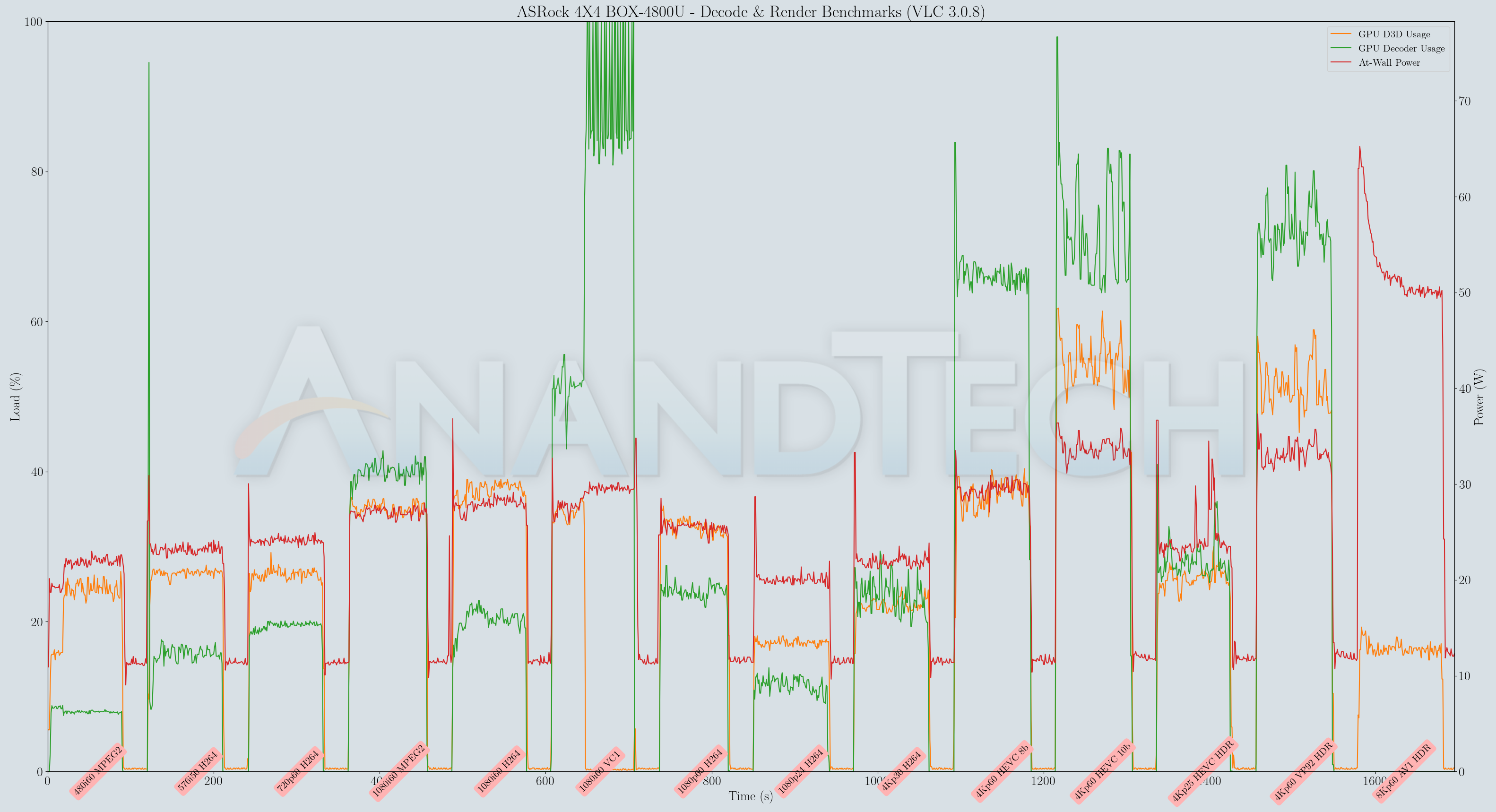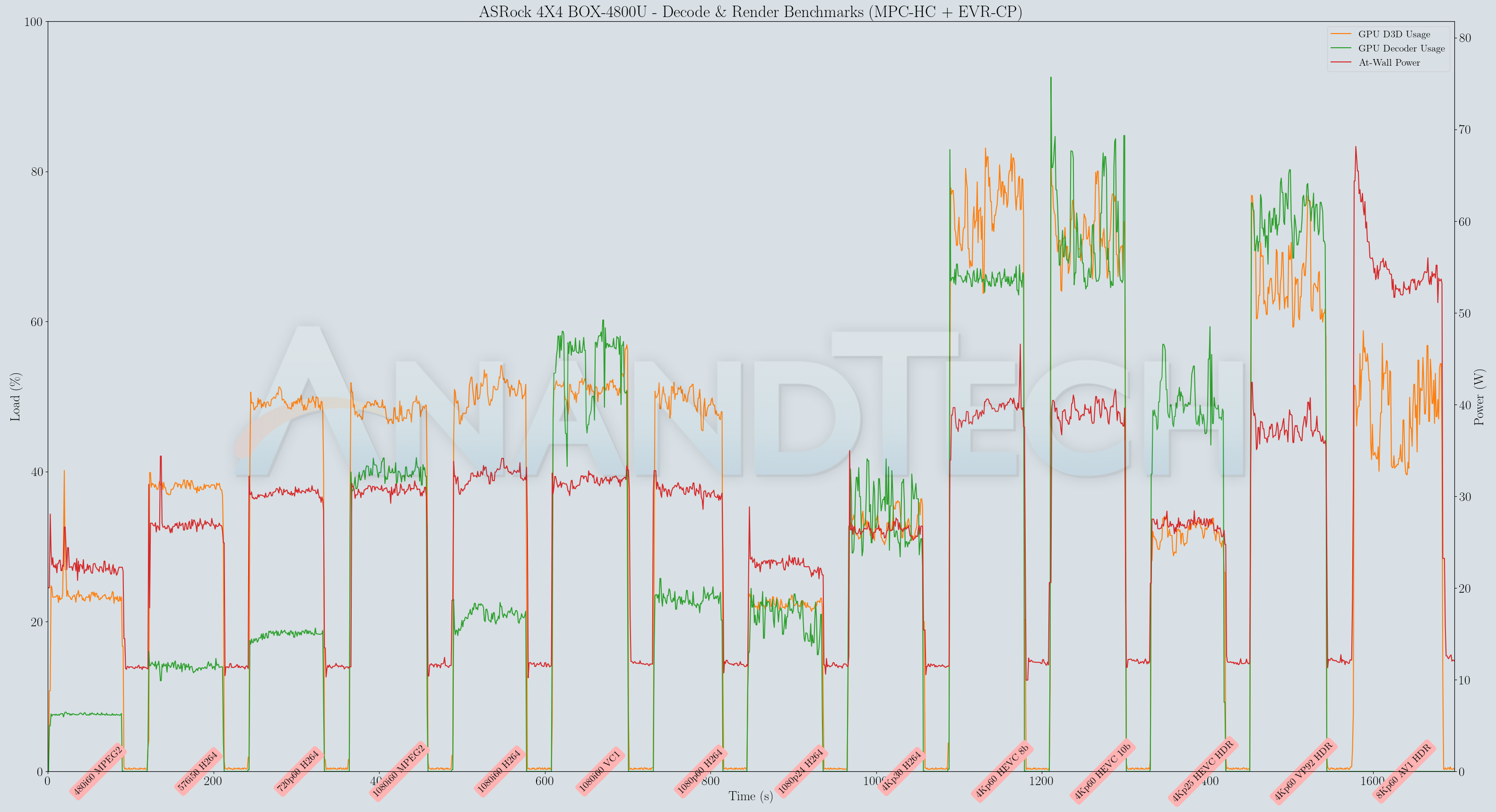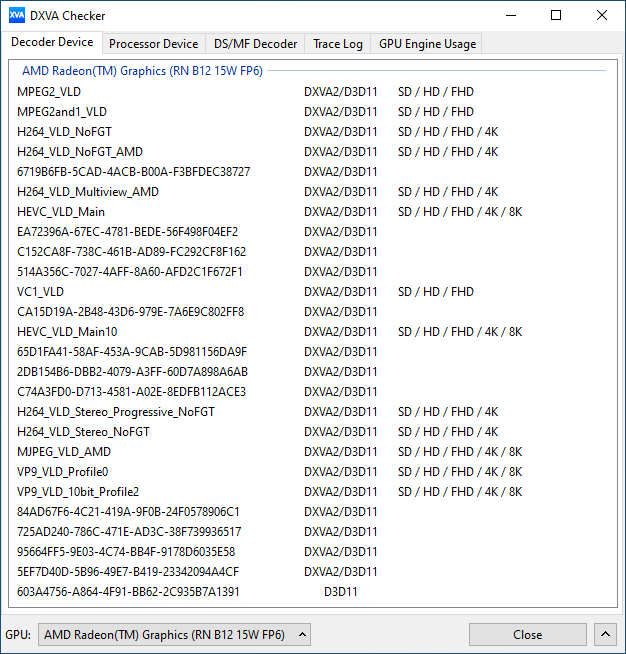ASRock Brings Zen 2 NUC : 4X4 BOX-4800U Renoir Mini-PC Reviewed
by Ganesh T S on November 25, 2020 11:00 AM ESTHTPC Credentials - II
Evaluation of local media playback and video processing is done by playing back files encompassing a range of relevant codecs, containers, resolutions, and frame rates. A note of the efficiency is also made by tracking GPU usage and power consumption of the system at the wall. Users have their own preference for the playback software / decoder / renderer, and our aim is to have numbers representative of commonly encountered scenarios. Towards this, we played back the test streams using the following combinations:
- MPC-HC x64 1.8.5 + LAV Video Decoder (DXVA2 Native) + Enhanced Video Renderer - Custom Presenter (EVR-CP)
- VLC 3.0.8
- Kodi 18.9
The fourteen test streams (each of 90s duration) were played back from the local disk with an interval of 30 seconds in-between. Various metrics including GPU usage and at-wall power consumption were recorded during the course of this playback. Prior to looking at the metrics, a quick summary of the decoding capabilities of the integrated Radeon GPU is useful to have for context.
On paper, the GPU should be able to play back all codecs with hardware acceleration (except for AV1).
All our playback tests were done with the desktop HDR setting turned on. It is possible for certain system configurations to have madVR automatically turn on/off the HDR capabilities prior to the playback of a HDR video, but, we didn't take advantage of that in our testing.
VLC and Kodi
VLC is the playback software of choice for the average PC user who doesn't need a ten-foot UI. Its install-and-play simplicity has made it extremely popular. Over the years, the software has gained the ability to take advantage of various hardware acceleration options. Kodi, on the other hand, has a ten-foot UI making it the perfect open-source software for dedicated HTPCs. Support for add-ons make it very extensible and capable of customization. We played back our test files using the default VLC and Kodi configurations, and recorded the following metrics.
| Video Playback Efficiency - VLC and Kodi | |||

VLC had trouble with the interlaced VC-1 clip, and there was no hardware acceleration for AV1. Kodi was flawless all through, though the 8Kp60 AV1 clip ended up consuming a lot of power with both players.
MPC-HC
MPC-HC offers an easy way to test out different combinations of decoders and renderers. The configuration we evaluated is the default post-install scenario, with only the in-built LAV Video Decoder forced to DXVA2 Native mode. The metrics collected during the playback of the test files using the above three configurations are presented below.

We usually attempt usage of madVR, but activating the filter resulted in some glitches. In any case, usage of madVR with integrated GPUs is not advisable. Similar to Kodi, the MPC-HC + EVR-CP combination makes good use of the hardware acceleration capabilities of the GPU to achieve satisfactory playback across all the tested codecs and resolutions. Hardware acceleration allows the system to never exceed 40W at the wall even for streams with high frame rates and large resolutions.











53 Comments
View All Comments
philehidiot - Wednesday, November 25, 2020 - link
I've been drinking, it's 1900 and I've only eaten breakfast today so bear with me.I'm just astonished that we're now using 64GB DDR4 to eliminate any chance bottlenecking. My last system had 24GB DDR3 and I'm now on 16GB DDR4 with no memory concerns.
As for *hic* SFF HTPC use, AMD has driver issues. I once said to a guy who deals in GPGPU stuff that "I don't have enough experience in drivers or coding to be able to say whether AMD's drivers are good or bad" and his response was "that's the same problem AMD have". If I'm using a PC for relaxing, having to debug or troubleshoot is not ideal. It's a shame, as noted in the conclusion here, that QA is often done on Intel systems and AMD don't get a look-in. Hopefully, as AMD become profitable and more performant they'll be able to convince people to QA on their hardware as well.
They definitely need to sort out their drivers and assess the OEM support for other hardware. It's a sad fact that, since I dropped Intel for AMD (both CPU and GPU), I've had more crashes in a month than in years of Intel/Nvidia systems. I've lost more time to lost work than when I was using Windows 98 and CTRL+S after every change is back to being automatic.
A few months ago I was trying to get 4K working on Netflix and their website specified only Nvidia card support or Intel iGPU decode support. Their support staff had never heard of the issue and so I went through the codecs supported by AMD and pointed out at least their hardware spec page should mention AMD once??? The guy couldn't help so he took it as a comment to escalate higher.
/ramble. I need crisps.
StevoLincolnite - Wednesday, November 25, 2020 - link
Got a secondary AMD rig that is 10+ years old and stays online for weeks at a time without a crash.Still runs games just fine, the more modern titles that are heavier threaded tend to run much better on the old Phenom 2 x6 and paired up with the Radeon RX 580 is a pretty capable 1080P rig.
Will upgrade it when it's useless.
YB1064 - Wednesday, November 25, 2020 - link
$900 is a bit too rich for my blood.BTW, what happened to the latest RTX 3xxx review? Did you guys give up on it?
Makaveli - Thursday, November 26, 2020 - link
Apparently you didn't get the memo.fcth - Friday, November 27, 2020 - link
No explanation as to the delay (originally it was related to the fires in California, but it sounded like they were past that), but Ryan said a couple days ago that they are still getting caught up: https://twitter.com/RyanSmithAT/status/13317467171...damianrobertjones - Wednesday, November 25, 2020 - link
...and Intel's driver support for Intel Nucs is hardly anything to scream about.dontlistentome - Wednesday, November 25, 2020 - link
Took Intel an age (over a year) to fix the BIOS updater on systems with Bitlocker - would fail to suspend the encryption so you'd be left with a machine that wouldn't boot, with a locked drive. Hope you kept the recovery key somewhere accessible.Samus - Thursday, November 26, 2020 - link
OMG I remember that bug, the worst part was there was no way to clone a drive to upgrade the SSD because you couldn't suspend bitlocker so you had to decrypt the drive which takes hours in some cases. 3-4 hour project just to upgrade an SSD...Yorgos - Thursday, November 26, 2020 - link
It took intel 3 or 4 years to fix the N2230 driver on linux.bananaforscale - Thursday, November 26, 2020 - link
I remember when Atoms first came and the NM10 chipset. It had crap support on Linux (didn't support resolutions beyond 800x600 for a while). Then there's Asus Transformer Book that has Intel hardware that's only supported under 32 bit Windows, so no upgrading to 64 bit (even if it would've been a bit silly in that particular case as it only had 2GB RAM). Linux is right out.